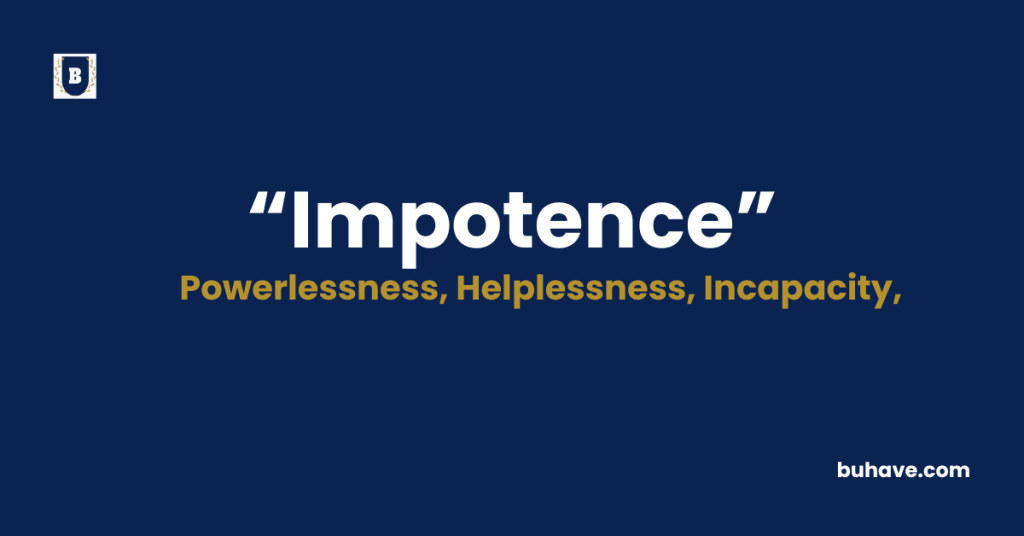The word ‘Impotence’ (Noun) refers to a state of being powerless, ineffective, or lacking strength whether physically, emotionally, or in terms of influence. In this guide, you’ll learn the full definition, synonyms, antonyms, etymology, and real-life examples of how to use ‘Impotence’ correctly in sentences.
Impotence Explained in Depth
A complete and detailed guide to the word Impotence including meaning, definition, examples, etymology, synonyms, and antonyms.
Meanings of Impotence
‘Impotence’ commonly describes a lack of power, ability, or effectiveness. It can refer to emotional helplessness, political or social powerlessness, or even physical conditions most notably male sexual dysfunction. In all uses, the core idea is an absence of force or control.
Definition
Impotence is the condition or quality of being weak, powerless, or unable to act effectively. It can refer to emotional, psychological, or physical inability to perform or influence outcomes, often used in medical, personal, or societal contexts.
Etymology
The word “impotence” comes from the Latin “impotentia,” meaning “lack of power or ability,” from “impotens” (not powerful). It entered English in the 14th century and has been used both literally and metaphorically to describe various forms of ineffectiveness or incapacity.
Example Sentences
- He felt a deep sense of impotence when he couldn’t protect his family during the crisis.
- The government’s impotence in managing the disaster drew heavy criticism.
- She was overwhelmed by her emotional impotence after repeated failures.
- The doctor discussed potential treatments for age-related impotence.
- Many citizens are frustrated by their political impotence in the face of corruption.
Impotence Synonyms
- Powerlessness
- Incapacity
- Helplessness
- Inability
- Weakness
- Ineffectiveness
- Debility
- Feebleness
- Incompetence
- Inaction
Impotence Antonyms
- Power
- Strength
- Capability
- Potency
- Effectiveness
- Authority
- Control
- Competence
- Dominance
- Force
FAQs about Impotence
Here are some frequently asked questions (FAQs) about the word “Impotence”
1. Is ‘impotence’ only a medical term?
No. While it’s often used in medicine to refer to erectile dysfunction, ‘impotence’ also describes emotional, social, or political powerlessness.
2. What’s the difference between impotence and weakness?
Weakness may suggest a lack of strength in a general sense, while impotence specifically refers to inability to act or influence.
3. Can impotence be emotional?
Yes. Emotional impotence describes the inability to express or act on one’s emotions effectively.
4. What causes political impotence?
It can stem from lack of representation, corruption, systemic failures, or authoritarian control.
5. What are alternatives to the word ‘impotence’ in writing?
You can use “powerlessness,” “inability,” or “helplessness,” depending on the context and tone.






